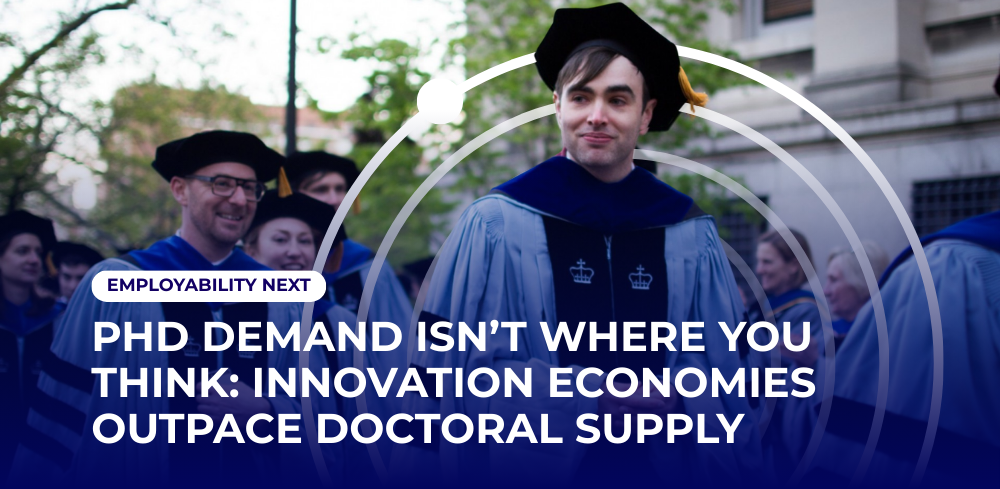Employability next | Big tech, bigger credentials: how universities are being challenged to adapt

As technology companies such as Google, Amazon and Microsoft expand their role in education, universities worldwide are facing a fundamental question: how should they respond when industry-issued credentials begin to reshape talent pipelines? Drawing from Emerging’s GEURS 2025 and Digital Leaders 2025 datasets and a close review of employer behavior, the message is clear: online certifications are no longer on the fringe. They’re becoming central to how talent is trained, evaluated, and hired.
The growing legitimacy of online credentials
The growth of online industry certifications is impossible to ignore. Google Career Certificates surpassed 1 million learners globally in 2024. With AI and big data, cybersecurity, and technological literacy among the fastest-growing skills, learners are preparing with these popular Google programs: Data Analytics, Cybersecurity and Project Management. Over 150 companies and 800 U.S. colleges now recognize or integrate these credentials.
Amazon Web Services (AWS), Microsoft, and Coursera are also blurring the line between academic and professional learning. Many universities now offer credit for completing industry-recognized short courses. These hybrid models allow students to accelerate their degrees while building job-ready skills.
Recruiters are taking note. The GEURS 2025 data shows that while some recruiters still hesitate to commit to regular hiring from online only graduates, the combined share of those who consider or hire online graduates either often or occasionally forms a clear majority among both Digital Professionals (DPs) and other employers.
Digital pros push the market: From openness to confidence in online Grads
The GEURS 2025 data signals a major shift: DPs are not only more open to hiring online-only graduates but also more confident in their competencies.
While DPs report slightly higher satisfaction overall, both groups express broad confidence in online-only graduates, with nearly 80% reporting at least moderate satisfaction with their employability.
Skills that stick in a digital job market
What makes these candidates appealing? Recruiters consistently point to two main strengths:
- Strong technical capabilities such as coding, cloud computing, and cybersecurity.
- Transferable soft skills including problem-solving and communication.
Notably, DPs stand out in one area: they are 12% more likely than other recruiters to believe that online programs are effective at delivering specialized knowledge in fields like artificial intelligence (AI) and machine learning (ML). This aligns with broader trends in the tech industry. For instance, AWS reported over 1.31 million active certifications in early 2024, a growth of 18% from the previous year. These credentials validate skills in cloud computing, a core area of modern tech infrastructure with certifications in AI and ML showing the growing demand for these specialized skills.
Where traditional academia still leads
Universities remain the primary engines of fundamental research. While industry demand for PhD talent is rising, most of these advanced degrees still originate in academia. As academic literature makes clear, short tech courses may build job-ready skills, but they cannot replicate the depth of training, critical thinking, and long-cycle research expertise that PhD programs provide.
Certificates accelerate market entry; universities compound depth. DP employers are effectively running a two-track model: short-form credentials for speed and scale, academic pipelines for breakthrough work. The point isn’t hierarchy but complementary: rapid skill signals on one side, long-cycle inquiry and critical thinking on the other, both now essential to the same innovation engine.
Hybrid education models and strategic implications
The gap between fast skills and deep expertise isn’t a gap anymore. It’s a single system. New hybrids sit where universities and industry meet, not as add-ons, but as a frame.
In these models, degrees act as the durable core. Around them, live credentials update in real time. Think, think of a Computer Science degree that already carries an AWS Solutions Architect certification inside it (a Degree-plus Stack). Credit moves with the learner, not just within a program through Capsule-to-Credit setups where online courses from platforms like Coursera or Google are converted into university credit. Doctoral work leans on real datasets and open tools, Sandbox Doctorates co-designed with industry, from training large language models to running applied climate analyses, so research meets production sooner. The result is not a shortcut, but a tighter loop between learning, proof, and deployment.
What does this mean for universities? Two simple truths. First, speed matters: employers read fresh, verifiable signals. Second, depth matters: the best teams still rely on rigorous thinking and long-cycle inquiry. The winning institutions will do both at once: show what students can do today without losing the habits that make them valuable tomorrow.
Make the degree the place where external signals plug in, get verified, and compound. Let research shape industry projects, and let industry questions sharpen research. If the architecture does this well, credentials won’t replace the university. They will reveal it.
What emerges is not a replacement of traditional education but a reconfiguration. The most adaptive universities will be those that become platforms, where cloud-based learning, academic depth, and local innovation coexist in a layered system.
As global recruitment patterns evolve and digital credentials mature, universities that embrace this shift can redefine their value, not just as knowledge providers but as active participants in the modern employment ecosystem.
-
Findings from the GEURS 2025 and DL25 datasets offer early evidence of this realignment and provide a roadmap for institutions navigating a post-traditional education market. For further insight or customized benchmarks based on institutional or regional data, contact Emerging.

















